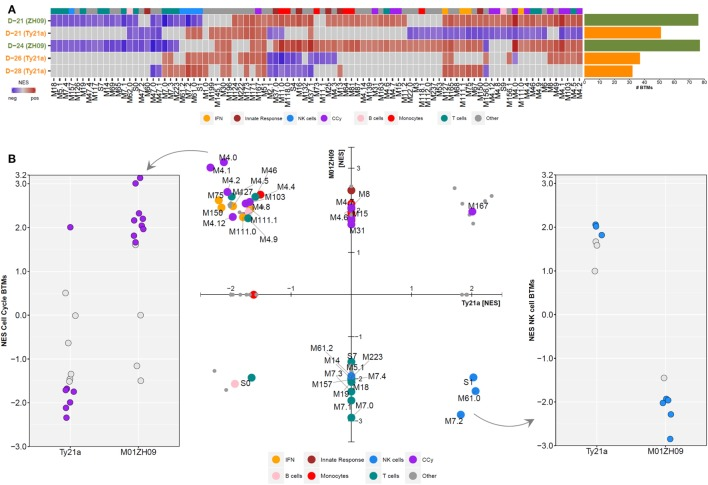Induction of Cell Cycle and NK Cell Responses by Live-Attenuated Oral Vaccines against Typhoid Fever.
The mechanisms by which oral, live-attenuated vaccines protect against typhoid fever are poorly understood. Here, we analyze transcriptional responses after vaccination with Ty21a or vaccine candidate, M01ZH09. Alterations in response profiles were related to vaccine-induced immune responses and subsequent outcome after wild-type Salmonella Typhi challenge. Despite broad genetic similarity, we detected differences in transcriptional responses to each vaccine. Seven days after M01ZH09 vaccination, marked cell cycle activation was identified and associated with humoral immunogenicity. By contrast, vaccination with Ty21a was associated with NK cell activity and validated in peripheral blood mononuclear cell stimulation assays confirming superior induction of an NK cell response. Moreover, transcriptional signatures of amino acid metabolism in Ty21a recipients were associated with protection against infection, including increased incubation time and decreased severity. Our data provide detailed insight into molecular immune responses to typhoid vaccines, which could aid the rational design of improved oral, live-attenuated vaccines against enteric pathogens.
Authors
Christoph J Blohmke; Jennifer Hill; Thomas C Darton; Matheus Carvalho-Burger; Andrew Eustace; Claire Jones; Fernanda Schreiber; Martin R Goodier; Gordon Dougan; Helder I Nakaya; Andrew J Pollard
External link
Publication Year
Publication Journal
Associeted Project
Systems Vaccinology
Lista de serviços
-
Is the gut microbiome key to modulating vaccine efficacy?Is the gut microbiome key to modulating vaccine efficacy?
-
Toxicogenomic and bioinformatics platforms to identify key molecular mechanisms of a curcumin-analogue DM-1 toxicity in melanoma cells.Toxicogenomic and bioinformatics platforms to identify key molecular mechanisms of a curcumin-analogue DM-1 toxicity in melanoma cells.

